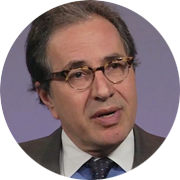Преходът,
който не стана така,
както бе замислен
Интервюта
Марк Блумфийлд

През 1990 г. Марк Блумфийлд е председател на Американския съвет за формиране на капитала - непартийна, подкрепяна от бизнеса, неправителствена организация, която провежда застъпническа, изследователска и просветителска дейност в поза на политики за икономически растеж. Заема тази длъжност и до днес.
В: Разбирам, че сте живели известно време в България, докато баща Ви е бил американски дипломат. Това преживяване оказа ли влияние върху желанието Ви да бъдете част от проекта за прехода и ако е така, как и по какъв начин?
О: Определено оказа влияние, защото имах много приятни спомени от България - тя е красива страна с велика история и огромен потенциал. Така че, имайки предвид опита си в политиката и икономиката, приветствах тази възможност. Имах късмет, защото Ричард Ран е един от най-близките ми приятели.
В: Как се включихте в проекта и каква беше Вашата роля?
О: Мисля, че Ричард просто се обърна към мен и това беше нещо естествено, защото прекарах известно време в България и продължавах в някаква степен да следя събитията. Мисля, че в общи линии ролята ми беше да подкрепям Ричард, но също така участвах и в разработването на данъчния компонент, защото в моята организация на тези въпроси отделяме голямо внимание.
В: Продължихте да сте свързани с България от времето си при прехода. Защо и какво сте направили в България през годините след прехода?
О: Бях силно заинтригуван от прехода, но имаше и лична история. При посещенията си срещнах съпругата си, която беше френска емигрантка в България. Така че бях лично обвързан, но и силно заинтригуван професионално от това, което се случваше в България.
В: Какви условия заварихте в България, когато стартира проектът?
О: Беше бедна страна, излизаща от диктатура и изправена пред преход в политиката, гражданското общество и икономиката.
В: Каква беше Вашата роля в данъчната реформа?
О: Данъците са ключова политика на правителството и това, което направих с помощта на други хора, беше да открия д-р Чарлз Маклюър, който беше един от водещите учени, наеман от всички международни организации, за да реформира данъчната система. Спомням си посещението при тогавашния финансов министър, просто задавах фундаментални въпроси като „каква е данъчната ви система и как работи?“. Беше много трудно да разбера, защото не е имало свободен пазар, за да се определят печалбите и загубите. Но това беше едно вълнуващо преживяване.
В: Участвахте ли изобщо в предоставянето на съвети от гледна точка на политическата страна на нещата?
О: Да, и по ирония на съдбата и при режима на Андрей Луканов, който се опитваше да превърне старата комунистическа партия в социалдемократическа партия, и в същото време при СДС, която беше нововъзникналата демократична партия. За разлика от други страни, които имат дълга история на разногласия, това беше ново преживяване за тях и беше свързано с основни неща като това как се създават политически партии, избирателната реформа, ролята на посредничеството между различни групи по интереси...
В: Какво се случи, когато докладът бе изготвен?
О: След като докладът бе изготвен, продължихме увлекателната история на българския преход. Щях да идвам в България по лични причини, свързани с моята съпруга, но също така щях да се ангажирам, било то чрез шоуто на Слави по телевизията или срещайки се с политически или граждански лидери, с насърчаване на напредъка в политиката, гражданското общество и икономиката, както бе очертан в нашия доклад.
В: Когато докладът бе завършен, имахте ли усещането, че ще бъде изпълнен от българското правителство?
О: Мисля, че имаше хаос до голяма степен и че не беше ясно. Чувствах се много добре, защото това беше най-малкото опорна точка и кратко описание на това, което трябваше да се направи. Мисля, че в някаква степен е чудо, че България успя да се издигне от дъното до държава член на Европейския съюз. Основната ми тревога и преди, и сега, тъй като бях свързан с консултирането на различни хора, е върховенството на закона. Мисля, че това все още е проблемно, тъй като ако няма върховенство на закона, политическата и икономическата ви реформа ще пострадат.
В: Каква е връзката Ви с българското правителство и опозицията в България?
О: Мисля, че започна на професионална основа по време на доклада, но впоследствие щях да пътувам до България почти всяка година и да подновявам тези приятелства. Мисля, че бях и официален съветник, и приятел, независимо дали става дума за СДС или за социалистическата партия, или за други нововъзникнали институции и бизнес организации.
В: Какво ще кажете за достъпа Ви до информация. Беше ли Ви предоставена необходимата информация, с която да работите?
О: Мисля, че това винаги е съмнително. Очевидно правителството ни даде това, което мислеше, че е в техен интерес, и имаше подкрепата на опозицията. Така че да, имахме информация, но, честно казано, част от необходимата информация просто не съществуваше.
В: Може ли да ни разкажете някоя от незабравимите си истории от България?
О: Моят последен ден в България през 1962 г. като дете. В нощта, в която тръгнахме, един господин, който всъщност живееше над нас и очевидно е бил служител на службите за сигурност, дойде при нас посред нощ и каза: „Надявам се, че някой ден моето дете и синът Ви (говореше на баща ми), ще могат да се срещнат открито и заедно да имат добро бъдеще“.